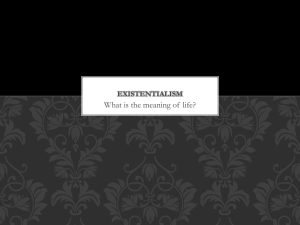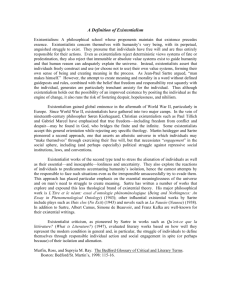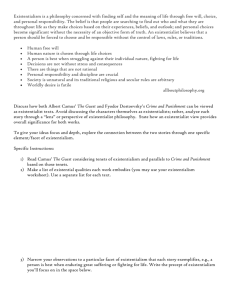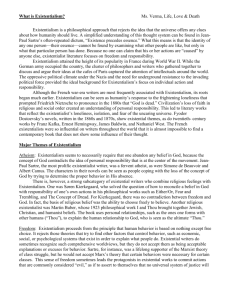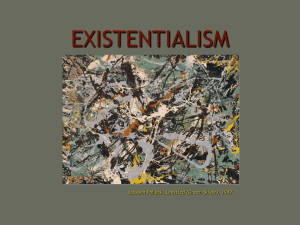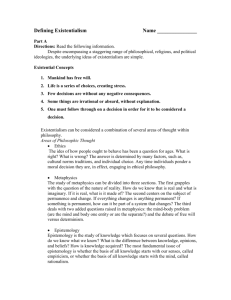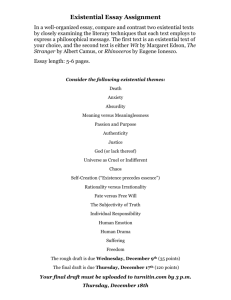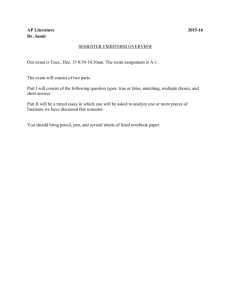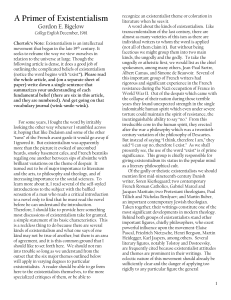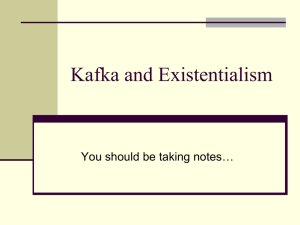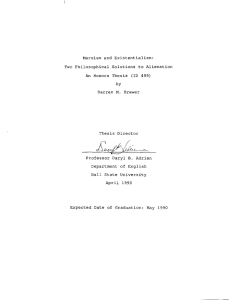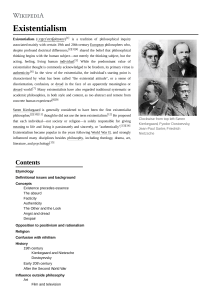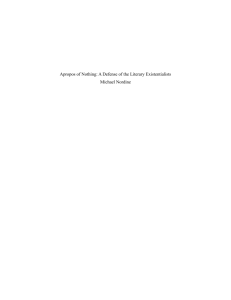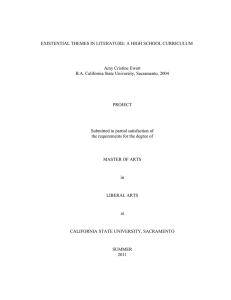Themes of Existentialism
advertisement
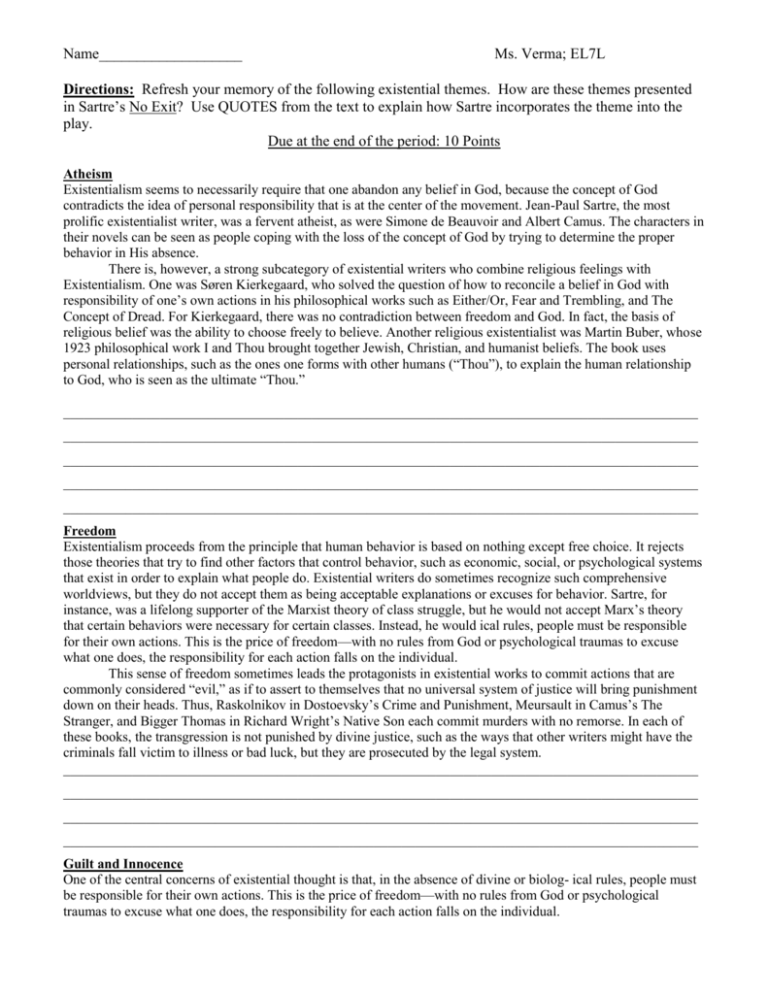
Name___________________ Ms. Verma; EL7L Directions: Refresh your memory of the following existential themes. How are these themes presented in Sartre’s No Exit? Use QUOTES from the text to explain how Sartre incorporates the theme into the play. Due at the end of the period: 10 Points Atheism Existentialism seems to necessarily require that one abandon any belief in God, because the concept of God contradicts the idea of personal responsibility that is at the center of the movement. Jean-Paul Sartre, the most prolific existentialist writer, was a fervent atheist, as were Simone de Beauvoir and Albert Camus. The characters in their novels can be seen as people coping with the loss of the concept of God by trying to determine the proper behavior in His absence. There is, however, a strong subcategory of existential writers who combine religious feelings with Existentialism. One was Søren Kierkegaard, who solved the question of how to reconcile a belief in God with responsibility of one’s own actions in his philosophical works such as Either/Or, Fear and Trembling, and The Concept of Dread. For Kierkegaard, there was no contradiction between freedom and God. In fact, the basis of religious belief was the ability to choose freely to believe. Another religious existentialist was Martin Buber, whose 1923 philosophical work I and Thou brought together Jewish, Christian, and humanist beliefs. The book uses personal relationships, such as the ones one forms with other humans (“Thou”), to explain the human relationship to God, who is seen as the ultimate “Thou.” ____________________________________________________________________________________________ ____________________________________________________________________________________________ ____________________________________________________________________________________________ ____________________________________________________________________________________________ ____________________________________________________________________________________________ Freedom Existentialism proceeds from the principle that human behavior is based on nothing except free choice. It rejects those theories that try to find other factors that control behavior, such as economic, social, or psychological systems that exist in order to explain what people do. Existential writers do sometimes recognize such comprehensive worldviews, but they do not accept them as being acceptable explanations or excuses for behavior. Sartre, for instance, was a lifelong supporter of the Marxist theory of class struggle, but he would not accept Marx’s theory that certain behaviors were necessary for certain classes. Instead, he would ical rules, people must be responsible for their own actions. This is the price of freedom—with no rules from God or psychological traumas to excuse what one does, the responsibility for each action falls on the individual. This sense of freedom sometimes leads the protagonists in existential works to commit actions that are commonly considered “evil,” as if to assert to themselves that no universal system of justice will bring punishment down on their heads. Thus, Raskolnikov in Dostoevsky’s Crime and Punishment, Meursault in Camus’s The Stranger, and Bigger Thomas in Richard Wright’s Native Son each commit murders with no remorse. In each of these books, the transgression is not punished by divine justice, such as the ways that other writers might have the criminals fall victim to illness or bad luck, but they are prosecuted by the legal system. ____________________________________________________________________________________________ ____________________________________________________________________________________________ ____________________________________________________________________________________________ ____________________________________________________________________________________________ Guilt and Innocence One of the central concerns of existential thought is that, in the absence of divine or biolog- ical rules, people must be responsible for their own actions. This is the price of freedom—with no rules from God or psychological traumas to excuse what one does, the responsibility for each action falls on the individual. Name___________________ Ms. Verma; EL7L ____________________________________________________________________________________________ ____________________________________________________________________________________________ ____________________________________________________________________________________________ ____________________________________________________________________________________________ ____________________________________________________________________________________________ Identity and Self Existentialism, like any philosophical movement, is a search for the right way to understand human identity. Other systems might conceive of identity in relation to something, such as when psychologists find the roots of identity in past experiences or in the effects of chemical balances in the brain, or when Romanticism frames identity in terms of humanity’s relationship to nature. In Existentialism, however, there is no point of reference for human identity. A person’s identity does not exist in anything except that person’s actions. As Sartre explained it, existence precedes essence— there are no rules governing a person’s essential identity until after that person exists. French Existentialism crossed over to America in the early 1950s, at a time that the Civil Rights movement was just beginning to give a voice and identity to black Americans. The two were a natural fit. Blacks who had been treated in American society in accordance with the color of their skin were open to the existential concept that a person creates his or her own identity. One of the preeminent American novelists of the twentieth century, Ralph Ellison, explored existential themes as they applied to the race issue in his 1952 novel Invisible Man, about a black man’s struggle for selfidentity against society’s narrow definitions of him. ____________________________________________________________________________________________ ____________________________________________________________________________________________ ____________________________________________________________________________________________ ____________________________________________________________________________________________ ____________________________________________________________________________________________ Alienation Alienation was considered by many intellectuals throughout the nineteenth and twentieth centuries to increasingly be the condition of civilized humans. It is the feeling of isolation, of not belonging, of standing alone. Since the advent of the Industrial Age, social philosophers like Karl Marx have shown how people are alienated from the work that they do, with the connection severed by the economic system. Psychologists have shown alienation as a rift between the conscious and unconscious aspects of self. Theologians have shown humanity as becoming increasingly alienated from reality as the importance of God has diminished. Existentialism can be seen as a response to the social phenomenon of alienation. As the feeling of being left out of society grew, so did the existentialist’s philosophy that it is natural to be separate from society, because the idea of belonging to society was an illusion all along. It is no coincidence that one of the most prominent novels of the French existentialist movement was Albert Camus’s The Stranger, which, as its title implies, highlights the idea that its protagonist is outside of the bounds of social order, alienated even from those closest to him. In novels such as The Deer Park in 1955, Norman Mailer applied the concept of Existentialism to the particular form of alienation that was felt in postwar America, with fear of the atomic bomb and of Communism. Mailer devised the concept of the “hipster,” who reacts to everything with his own wry sense of irony. In fact, the term “existential hero” came to be used to describe characters in books and movies who acted alone, who had no ties to anyone, and who followed the rules of behavior set down by their own understanding of the world. ____________________________________________________________________________________________ ____________________________________________________________________________________________ ____________________________________________________________________________________________ ____________________________________________________________________________________________ ____________________________________________________________________________________________
